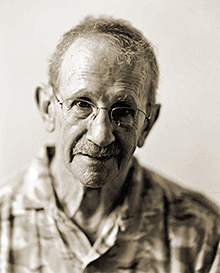Philip Levine (1928–2015)
 |
||
| photo by Geoffrey Berliner | ||
With deep sadness, we at Blackbird note the death of Philip Levine, a generous friend and magnificent poet. He so very kindly responded to our request for work for our first issue of Blackbird, and we have been privileged to present him reading, answering questions, and writing in the ensuing years. He was also Larry Levis’s friend and teacher, and affection for Larry was a bond that we shared.
In introducing Phil Levine on September 23, 2010, at Levis: A Celebration, a conference marking the acquisition of the Levis papers by the VCU Libraries, David St. John, also a Levine student, made the following, most fitting remarks.
Philip Levine ranks among the finest poets this country has ever produced. He belongs with those who are most thoroughly American. Writing in the great traditions of William Carlos Williams, eschewing opera in favor of jazz, the drawing room in favor of the kitchen, the silk-covered settee in favor of the bus station bench.
What we admire about Levine’s poetry is the emotional riskiness, its large and deeply felt commitments. It is a poetry ultimately carried forward and transmuted by passion, by a stubborn will to remember and to testify. In our reactionary and forgetful time, his radiantly human and memorializing poems help us to understand our lives. Philip Levine’s poetic vision, nearly religious, transcends natural boundaries and transcends time. His voice blurs the line between poetic utterance and prayer. His lyrical compassion, anger, and hopefulness make him one of the most authentically moving poets of this, or any other, age. His poetry is tender without being sentimental, calm but not lacking in passion. Written in a diction as clear and lucid as spring water. Of all contemporary poets, he has probably remained most faithful to the world of the American underclass and its working class. For Levine brings the lives of ordinary working people into focus as they float up upon the breath of memory—a memory charged with affection and good humor. There’s a brave humanity in his work, the constant awareness of the deep and simple truth. And sometimes I wonder if any American poet since Whitman, since Whitman himself, has written elegies as consistently magnificent.
A reader one hundred years from now will learn more about the secrets of our time from Philip Levine’s poetry than that of any poet I know. Those are the words of Peter Stitt, Eddie Hirsh, Peter Davis, Phoebe Pettingell, Alfred Corn, John Martone, and Harold Bloom. They represent a spectrum of American critical understanding that Philip Levine is the poet of our time. And in my own words, he is not only the greatest teacher of poetry in America, he’s the person who’s made possible the poetry of my generation, the poetry of Larry Levis, and the poetry of American poets for years to come.
Please remember Phil through his poems, through his voice. ![]()
Philip Levine in previous issues of Blackbird


